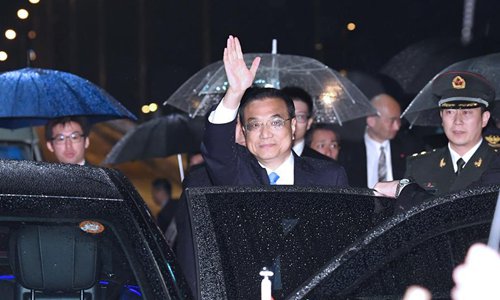




 Back To List
Back To List

Chinese Premier Li Keqiang arrived in Tokyo Tuesday night to begin his visit to Japan that observers expect will start bilateral cooperation on the Belt and Road initiative.
During his visit, Li will hold talks with Prime Minister Shinzo Abe, meet Emperor Akihito, and address a grand reception commemorating the 40th anniversary of the signing of the China-Japan Treaty of Peace and Friendship, among other events, the Xinhua News Agency reported.
China and Japan's economies are highly complementary and China will sign a bilateral currency swap agreement with Japan, Li said in an article published by Japan's Asahi newspaper on Tuesday.
China will also grant a quota of Renminbi Qualified Foreign Institutional Investors (RQFII) to Japanese investors, Li said in the article.
Common interests, including facing the threat of protectionism and the dramatic, developing changes in the Korean Peninsula situation, have contributed to the recovery of China-Japan relations, said Da Zhigang, director of the Heilongjiang Academy of Social Sciences' Institute of Northeast Asian Studies.
China's demand on up-stream products such as core components for electronics is under threat from US protectionist policies, and China can reduce this pressure by cooperating more closely with Japan. Meanwhile, Japan's economy, which relies heavily on international trade, also needs to boost cooperation with like-minded countries to reduce the threat of protectionism, Da said.
"A bilateral currency swap agreement will help these two major economies work together on reducing international financial risks and crises," he added.
Japanese companies are also eager to share the opportunities being created by the Belt and Road initiative, said Li.
"Although China and Japan have been competitive in the past while conducting infrastructure construction in developing countries, they can also be complementary," said Wang Yiwei, director of the Institute of International Affairs at the Renmin University of China.
Japan has experience and high standards, China has financial and executive powers, and cooperation between the Japan-initiated Asian Development Bank and the China-initiated Asian Infrastructure Investment Bank can largely avoid unnecessary competition, Wang said.
Apart from economic and trade cooperation, maritime issues will also be on the agenda of the meeting between Li and Abe. Japanese media Kyodo News reported that the two leaders will agree on a maritime and air liaison mechanism aimed at preventing unintended clashes.
Chinese foreign ministry spokesman Geng Shuang said on Monday that "China and Japan share the same goal on crisis management in the East China Sea. Establishing the China-Japan maritime and air liaison mechanism will help our two sides step up mutual trust, manage differences and uphold peace and stability in the East China Sea."
The two countries are accelerating preparations for the mechanism, Geng said.